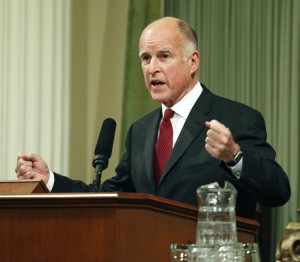
Gov. Jerry Brown was on KQED Forum today discussing the recently signed regional pact with Oregon, Washington state, and British Columbia to fight global warming.
But as Paul Rogers, managing editor of KQED Science and an environmental reporter for the San Jose Mercury News wrote yesterday, rather than hailing Brown, environmentalists are focusing on an area in which they disagree with Brown. Just a day after the global warming pact was signed ...
... environmentalists lashed out at Brown for his full-throated support(of) fracking, the controversial practice in which oil and gas companies inject water, sand and chemicals into the ground to fracture underground rock formations and release huge amounts of fossil fuels. Those are the very substances that scientists say are causing more global warming.
"To see the governor support fracking at a climate change event is terribly ironic," said attorney Kassie Siegel with the Center for Biological Diversity, an environmental group. "Gov. Brown is a climate leader, but supporting fracking can undermine all that he has done." Full article
Forum host Michael Krasny asked Brown about the issue, and in characteristic fashion, the governor didn't mince words.
Transcript:
Krasny: Critics are saying, "Can you really have a meaningful climate change pact if you don’t address fracking?"
Brown: The premise of that assertion is that climate change is primarily about fracking. And that’s the most absurd idea I’ve ever heard.
This is like saying one tire in the 1 billion vehicles in the world is the problem. Fracking is a point, it’s an issue, but climate change is dealing with cars, with power plants, with cows, with agriculture, with cement, with land use, with many, many things....
The key point here that most people have in their minds is fracking the Monterey shale. Nobody’s doing that. At best it’s several years if it ever happens. And it can’t happen until a major and the first serious scientific study to an environmental impact analysis that I required by a law I signed two months ago is done. I’m supervising that analysis and we’re going to find out.
Some of these fracking people, I talked to one young lady, I said, "Give science a chance." [She said,] “No, I don’t’ need that, I studied it in college." She did not study fracking the Monterey shale in college, because it has not been studied in any serious way before. But it will, and there will be plenty of time to make comments, the state will have to respond to each of the hundreds of thousand of comments. This is a big deal, and the fact that people have just pretended not to see it as a big deal, shows you the utter emptiness of some of the political debate today. People don't know what the hell they’re talking about.
